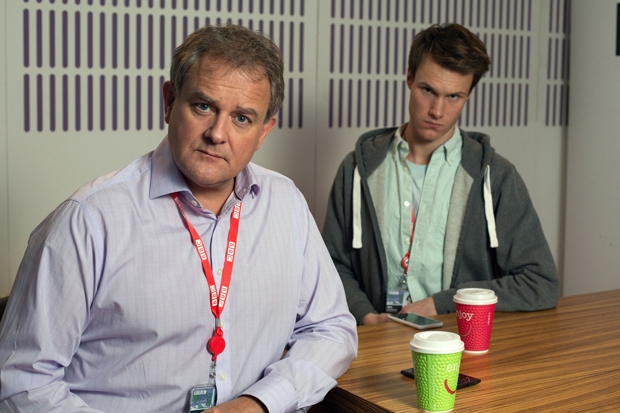Ever since the days of Tony Hancock, many of the best British sitcoms — from Dad’s Army to Fawlty Towers, Rising Damp to The Royle Family — have featured a middle-aged man convinced that he’s the only sane person left in an increasingly mad world. The frankly subversive twist in W1A (BBC2, Thursday) is that the middle-aged man in question might well be right. As the BBC’s Head of Values, Ian Fletcher (Hugh Bonneville) is surrounded by any number of jargon-spouting younger colleagues whose apparent aim is not to let anybody realise how stupid they are — or at least it would be if they realised it themselves.
Head of Output Anna Rampton, for example, obviously believes that making statements like ‘We do it well, but we could do it better than well’ will help her chances of being appointed to the new BBC post of Director of Better. Her rival Matt Taverner, the Generic Head of Drama and/or Comedy, doesn’t actually read the scripts he’s discussing, but knows he can always fall back on wondering if they should be more multicultural. Brand consultant Siobhan Sharpe develops ideas — or if you prefer, talks nonsense — with her team of trending analysts, viral concept designers and ideation architects, before pontificating with utter certainty about what the corporation should be doing, despite not knowing who David Dimbleby is, or what the letters BBC stand for.

Ian, meanwhile, also has to battle a dysfunctional computer system with the brilliant name of Incompatico — as well as New Broadcasting House itself, with its think-pods, hot-desking and large wall-mounted mottoes in which platitudes pose as aphorisms. (I only hope that the building’s designers are watching as their ideas are revealed not merely as unfit for purpose, but as comedy gold.)
In fact, W1A is so pitch-perfect that its only real downside for those of us who fundamentally like the BBC is that it can often be quite depressing. Apparently, when the programme makers advertised the post of Director of Better on the BBC’s internal website as an April fool’s joke, almost nobody spotted anything untoward, even though the job specification demanded ‘the ability to manage a wide range of incompatible priorities while remaining calm and, where necessary, in Salford’.
For understandable reasons, everybody involved in the show tends to suggest in interviews that its satirical targets are by no means exclusive to the BBC — which, up to point, might even be true. After all, the employees of any large organisation will presumably recognise the sight of people who should (or perhaps secretly do) know better, nodding sagely at the meaningless guff said by their executives and consultants. They could well end up saying similarly dumb things themselves — or, worse still, believing them. They, too, may be constantly forced to contend with the people above them second-guessing the people above them who are second-guessing the people above them.
And yet, what other organisation has to deal with, say, the problems of its Wimbledon coverage being ‘too white’ or Jeremy Clarkson, in happier times, overusing the word ‘tosser’ — both of which figured prominently in Thursday’s episode? (The Clarkson question was dealt with in the weekly Damage Limitation Meeting, which decided that one ‘tosser’ an episode was fine, but any more was inappropriate.)

In other words, for all those self-protective claims to universality, at heart W1A clearly is about the BBC — which may explain why it packs a more vicious punch than its predecessor Twenty Twelve. Back then, when Ian Fletcher was in charge of the preparations for the London Olympics, the result was still a sharp and very funny attack on modern idiocies. This time, though, it’s surely personal, with the writer/director John Morton and producer Paul Schlesinger (old BBC hands both) mounting an unmistakably heartfelt fightback against the forces of darkness. Now, if only satire worked…
Later with Jools Holland (which, as Harry Hill pointed out, some people might prefer to be earlier, and not with Jools Holland), has recently returned to BBC2, with its usual noble aim of providing the most varied assortment of music around. The bad news for Jools, however, is that there’s still one weekly programme that regularly achieves a far more eclectic mix. I refer of course to the broadcasts of old editions of Top of the Pops on BBC4 (Thursdays).
Because TOTP essentially played any song in the charts, any song in the charts is exactly what we get, however weird the juxtapositions. So it was that this week’s episode, from April 1980, began with Judas Priest, Madness and Barbara Dickson — and ended with Prima Donna (as I’m sure you know, Britain’s Eurovision entry that year) followed by The Jam and Dr Hook. Weirder still, it once again served up such juxtapositions as if they were the most normal thing in the world.






Comments